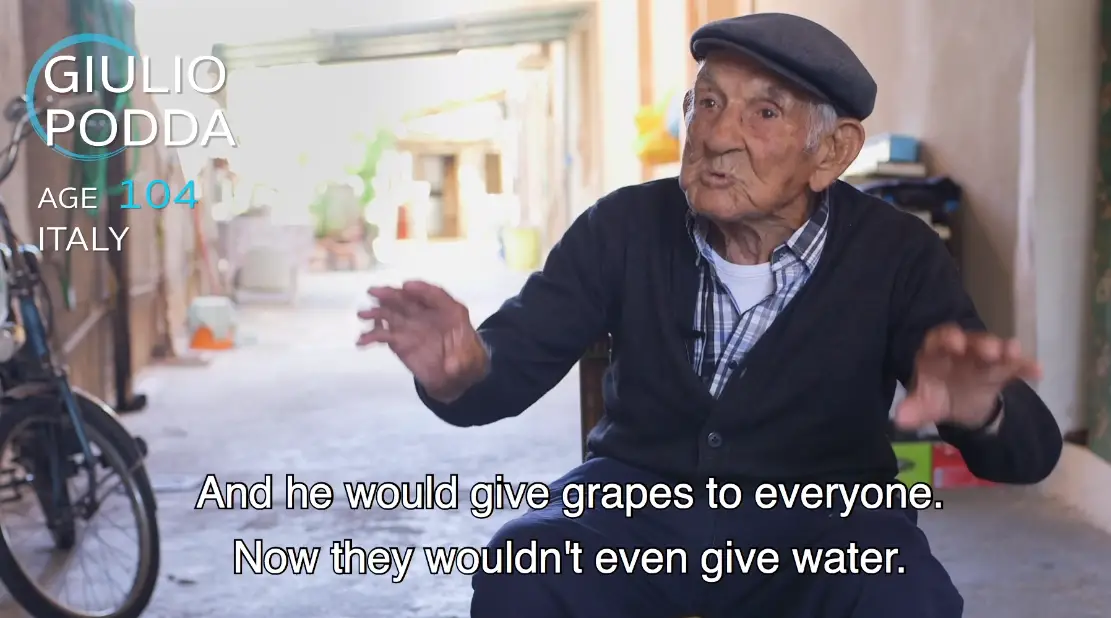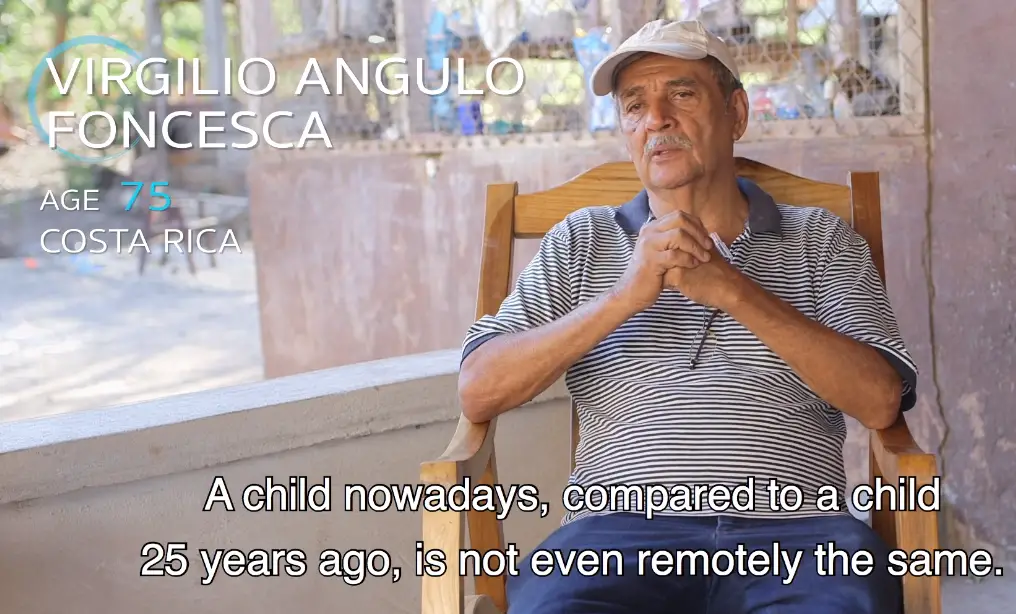
104-year-old Giulio Podda of Sardinia, Italy. Click the picture to learn more about ‘The Human Longevity Project,’ or to watch.
One of the most fascinating things about natural health is knowing the potential we all possess to live longer, healthier and yes, happier lives than any generation before us.
While the picture of aging for millions of people is being stuck in a cramped, dark and sterile nursing home or hospital ward, living out our final days in sorrow and emptiness, the truth of the matter is that there are cultures around the world who instinctively know that this is not the way it has to be, by any measure.
In Okinawa, Japan for example, elderly people aren’t simply cast aside like so many are nowadays in the U.S.
Instead, they are celebrated for their wisdom, steadfast contributions to society, and the simple joy of living a long and fulfilling life surrounded by members of their family and community, culminating with parades through the streets in celebration of reaching old age.
Because the elderly are so respected and valued, their wisdom is more easily passed down to the next generations, preserving their community’s simple and jovial ways of life.
Other residents of the world’s longest-living communities work, live, play cards, drink wine, and generally have a fantastic time well into their 90s and 100s, in places like Sardinia, Italy; Ikaria, Greece, the Nicoya Peninsula in Costa Rica and a few select other areas.
This is the way we were meant to live, and it’s on full display in a new docu-series chronicling the lives and health secrets of the world’s longest-living communities.
Titled ‘The Human Longevity Project,’ this ground-breaking docu-series may be the most important of its kind so far in 2018 (the last episode is airing tonight at 5 p.m., you can watch here for free).
The Human Longevity Project’ Reaches Its Final Hours
If you haven’t had a chance to watch ‘The Human Longevity Project’ yet, I can’t recommend it highly enough.
This docu-series offers the perfect response to anyone who’s afraid of embracing a holistic health lifestyle —because it shows real people with real lives, full of personality and vigor, along with common sense, humor, practicality and wisdom, embodying the way things used to be back when our parents and grandparents were growing up.
Their lives are the picture of true health.
Community Elders Speak Out on Modern Technology
The final episode of the series (watch ‘The Human Longevity Project’ here for free now) talks about how we can marry our newfound digital lives, based around social media and individualism, with the traditional way of joyful community and family living so many of these societies have perfected.
“A child 25 years ago, compared to a child now, is not even remotely the same,” says Virgilio Angulo Fonseca, a 75-year-old living in one of the longest-living areas of the world, the Nicoya Peninsula in Costa Rica, in Episode 9.
“Now everything is computer, Internet, telephones. And this all started around 18-20 years ago,” he said.
Anoher interviewee named Giulio Podda, a 104-year-old resident of Sardinia, Italy (who is surprisingly full of life at his ripe old age) speaks about a time when everyone felt supported, and how that spirit of community and sharing has been greatly lost.
“Back then when you were a worker, poor as I was, you would go to a vineyard, ask for grapes, and get some,” he explains in Episode 9. “Now they wouldn’t even give water.”
Younger Generation Eschewing Community for Technology
Also in Episode 9 we see 68-year-old Cristina Castillo, another resident of the Nicoya in Costa Rica, clutching a cell phone ironically enough while talking about the importance of community and traditional living.
“Excessive…The change has been very excessive,” she says. “Everyone knew each other and were docile people. And if something happened, they protected each other.
“With change, now it isn’t like that.”
Another younger resident talks about how local traditions are being lost as the next generation becomes enamored not just with the Internet but also with processed foods.
It’s becoming so bad that many of the food staples, including the famous rice and bean dishes that the people of the Nicoya attribute their incredible health and longevity to, are being imported from places like China and Mexico instead of being grown locally and organically.
We’ve already seen it happen here in the U.S. and other first-world nations, now it seems as if no area of the globe is being left untouched.
Moving Forward and Reclaiming Our Destiny: Combining Ancient Wisdom With Modern Technology
It’s clear that from the most traditional villages to the biggest city metropolises, our obsession with technology and social media is not going away any time soon.
Of course now the quesiton becomes, how can we utilize this technology to benefit our health and bring people together, rather than to create isolation and dependency?
Healthier societies generally are happier and more social, which is where health technology comes in.
The discussion moves to sustainable eco-communities, neurofeedback technologies to help us block out distractions in today’s social media obsessed world, as well as technologies that help to offset and mitigate the problems caused by modern technology (such as blue-blocking TrueDark Glasses which author Dave Asprey says are like “noise canceling headphones for our eyes” and a must-war for anyone who watches TV or checks their phones late at night).
The communities of the future will marry these technologies with ancient traditions like communal eating, work and farming in order to create a happier, healthier, and yes, longer-living human society.
“What are we going to do tomorrow to get where we want to be again?” asks one of the health researchers in the movie. “That requires a lot of trust, a lot of community and a lot of dialogue.
“Not in a traditional way but in a reimagination of those old methods with all of this wonderful technology we have as well.”
How to Watch (Or Purchase) the Full Series
For more information or to watch Episode 9 in full, you can click on this link.
The series comes to a close tomorrow at 5 p.m., but stay tuned for a replay weekend and more chances to watch all nine episodes again.
You can also purchase your copy of ‘The Human Longevity Project’ for your collection on the Longevity Project’s website by registering here and following the instructions.
I’ve seen a ton of health documentaries in the five years I’ve been running this website, and out of them all this is the biggest standout of the bunch.
It shows what it truly means to be human in this changing and increasingly isolated world.
The hope now is that we can preserve and grow these traditions again so that every human being can experience the joy of what it truly means to be human again, for decades and generations to come.
Special thanks to The Human Longevity Project for helping to make that happen, and keeping these traditions alive for all to see.
Thanks for installing the Bottom of every post plugin by Corey Salzano. Contact me if you need custom WordPress plugins or website design.





